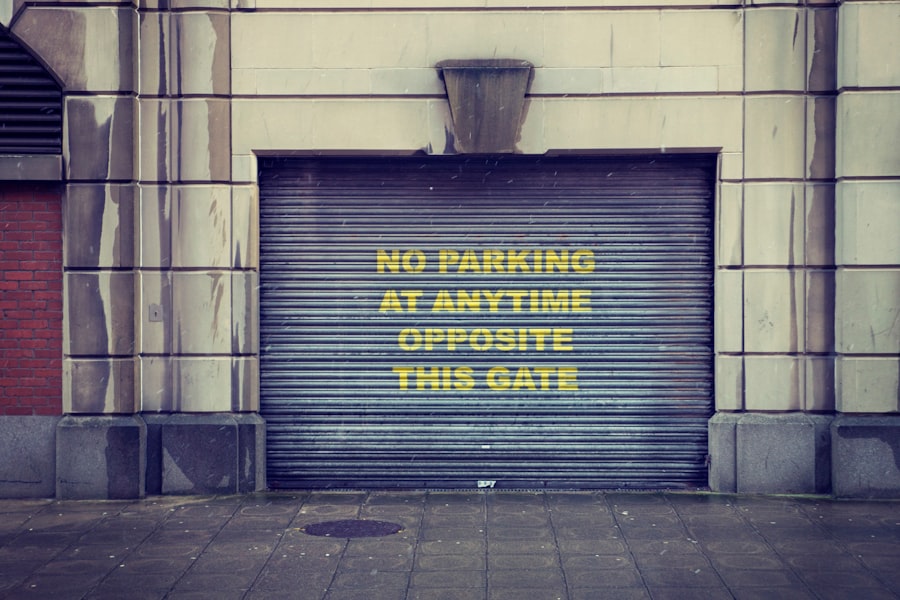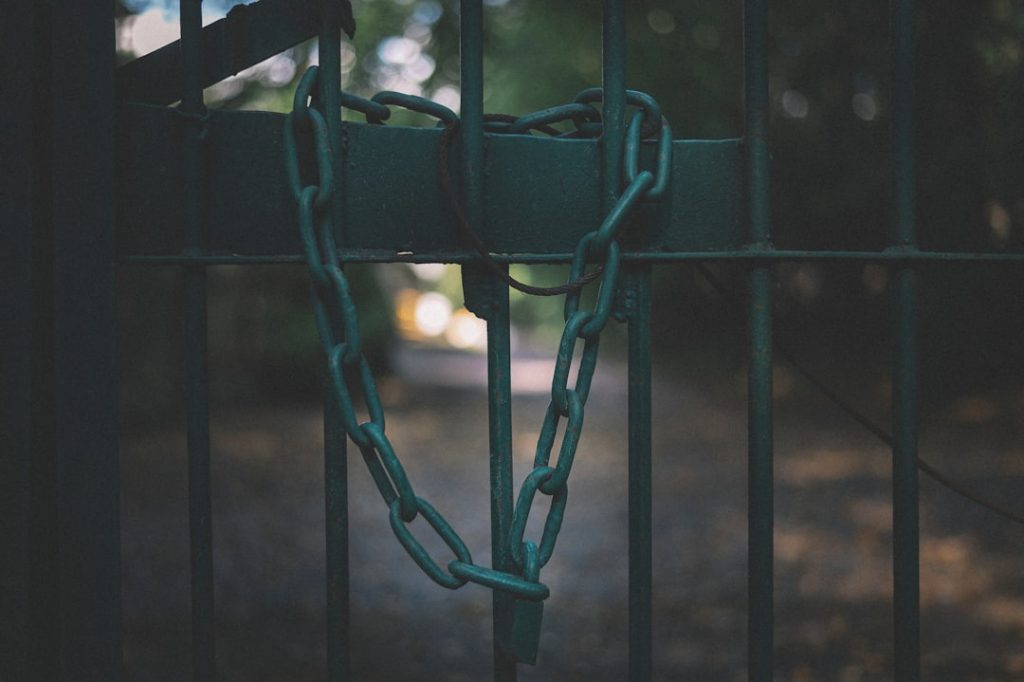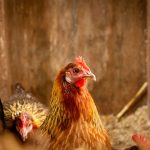Maintaining a closed gate on your chicken coop is crucial for the protection and welfare of your flock. The gate acts as a barrier against predators such as foxes, raccoons, and domestic dogs, which can pose significant threats to chickens. A closed gate also prevents chickens from wandering into potentially dangerous areas like busy roads or neighboring properties.
Keeping the gate closed helps establish a routine for the chickens, as they learn to recognize the coop as their safe haven. This practice also aids in maintaining the flock’s health and hygiene by allowing better control over their food and water access, as well as easier monitoring of their overall condition. It is particularly important when specific dietary requirements or medications are necessary for certain birds.
Additionally, a closed gate contains chicken waste within the designated area, simplifying coop maintenance and cleaning. By consistently keeping the gate closed, chicken owners create a secure and healthy environment that promotes the well-being and thriving of their flock.
Table of Contents
Key Takeaways
- Keeping the gate closed is important for the safety and security of your chickens
- Consequences of leaving the gate open include potential predator attacks and chickens wandering off
- Understanding chicken behavior can help in implementing effective gate-closing strategies
- Strategies for keeping the gate closed include using latches, locks, and regular checks
- Communicating with your chickens through consistent routines and positive reinforcement can help them understand the importance of a closed gate
The consequences of leaving the gate open
Predator Attacks and Flock Safety
One of the most immediate dangers of an open gate is the increased risk of predator attacks. Predators such as foxes, raccoons, and even birds of prey can easily enter the coop and harm or kill your chickens if the gate is left open. This can result in devastating losses for your flock and can also create a sense of fear and stress among the remaining chickens.
Wandering Chickens and Conflicts
Additionally, an open gate allows your chickens to wander off into areas where they may be at risk of harm, such as busy roads or neighboring properties. This not only puts your chickens in danger but can also create conflicts with neighbors or local wildlife.
Health and Hygiene Risks
Leaving the gate open can also have negative implications for the overall health and hygiene of your flock. When given unrestricted access to the surrounding environment, chickens may consume harmful substances or plants that can make them sick. They may also come into contact with parasites or diseases that can spread throughout the flock. Furthermore, an open gate can lead to an accumulation of waste in areas where it shouldn’t be, creating unsanitary conditions that can attract pests and pose health risks for both the chickens and their caretakers.
Understanding chicken behavior

Understanding chicken behavior is essential for effectively managing and caring for your flock. Chickens are social animals with complex social structures and communication systems. They have distinct personalities and behaviors that are influenced by their environment, genetics, and past experiences.
Chickens have a natural instinct to forage, explore, and establish a pecking order within their flock. They also have a strong homing instinct and will return to their coop at nightfall for safety and rest. Chickens communicate through a variety of vocalizations, body language, and behaviors.
They use different sounds to express emotions such as contentment, distress, or alarm. They also use body language such as fluffing their feathers, pecking, or posturing to establish dominance or communicate with other flock members. Understanding these communication cues can help you better interpret your chickens’ needs and emotions.
Chickens also have natural instincts for self-preservation and will exhibit behaviors such as seeking out shelter, avoiding predators, and protecting their young. By understanding these instincts, you can better anticipate your chickens’ needs and provide them with a safe and secure environment in which they can thrive.
Strategies for keeping the gate closed
There are several strategies you can employ to ensure that the gate to your chicken coop remains closed at all times. One effective method is to install a secure latch or lock on the gate that requires human intervention to open. This can prevent accidental openings by wind or other animals and ensures that only authorized individuals have access to the coop area.
Additionally, you can consider installing a self-closing mechanism on the gate that automatically closes behind anyone entering or exiting the coop. This can serve as an extra layer of security to prevent the gate from being left open unintentionally. Another strategy is to establish a routine for checking and closing the gate at specific times each day.
By incorporating this task into your daily chores, you can ensure that the gate is consistently closed and secure. You can also consider using visual cues such as signs or flags near the gate to remind yourself and others to close it after use. Additionally, training your chickens to respond to specific cues or commands can help reinforce the importance of keeping the gate closed.
Furthermore, you can create physical barriers around the coop area such as fencing or netting to prevent chickens from wandering off even if the gate is left open. This can provide an added layer of protection against potential dangers outside of the coop area. By implementing these strategies, you can help ensure that the gate to your chicken coop remains closed and secure at all times.
Communicating with your chickens
Effective communication with your chickens is essential for establishing trust, managing behavior, and ensuring their well-being. Chickens are highly responsive to human interaction and can learn to recognize specific cues or commands over time. One way to communicate with your chickens is through consistent vocalizations or sounds that they can associate with certain actions or behaviors.
For example, you can use a specific call or whistle to signal feeding time or use a different sound to indicate danger or distress. Body language is another important form of communication with chickens. By using consistent gestures or movements, you can convey messages such as approaching with food or gently guiding them in a certain direction.
This can help establish trust and reduce stress when handling or interacting with your chickens. Additionally, positive reinforcement through treats or rewards can be used to communicate desired behaviors with your chickens. By associating specific actions with rewards, you can encourage behaviors such as returning to the coop at nightfall or staying within designated areas.
This form of communication helps reinforce positive behaviors and encourages cooperation from your flock. Overall, effective communication with your chickens involves consistency, patience, and understanding of their natural instincts and behaviors. By establishing clear communication cues and using positive reinforcement, you can build a strong bond with your flock and ensure their safety and well-being.
Training your chickens to respect the closed gate

Positive Reinforcement Techniques
You can use positive reinforcement techniques, such as treats or rewards, to encourage desired behaviors from your chickens in relation to the closed gate. For example, providing treats inside the coop area when the gate is closed can encourage them to enter willingly and associate it with positive experiences.
Visual Cues and Deterrents
Using visual cues, such as flags or signs near the gate, can remind your chickens of its importance. Consistently using these visual cues in conjunction with closing the gate can help reinforce the idea that it should remain closed at all times. Additionally, you can consider using deterrents, such as motion-activated alarms or sprinkler systems near the gate, to discourage chickens from attempting to leave or enter when it is closed.
Consistency and Results
By implementing these training strategies consistently over time, you can help teach your chickens to respect the closed gate and reduce the likelihood of them attempting to escape.
Maintaining a secure coop area
Maintaining a secure coop area is essential for ensuring the safety and well-being of your flock. One important aspect of this is regularly inspecting and repairing any potential weak points in the fencing or structure surrounding the coop. This includes checking for gaps, holes, or loose sections that could allow predators or other animals access to the coop area.
Additionally, it’s important to keep the surrounding area clear of potential hazards such as overgrown vegetation or debris that could provide cover for predators or pose risks to your chickens. Regularly trimming vegetation and removing debris helps maintain visibility around the coop area and reduces potential hiding spots for predators. Another important aspect of maintaining a secure coop area is implementing predator deterrents such as motion-activated lights or sound devices that can startle potential threats away from the coop.
These deterrents help create an added layer of protection against predators attempting to gain access to your flock. Furthermore, regularly cleaning and disinfecting the coop area helps reduce potential health risks for your chickens by minimizing exposure to parasites or diseases. This includes removing waste, replacing bedding, and disinfecting surfaces within the coop on a regular basis.
By consistently implementing these maintenance practices, you can help create a secure environment for your flock that minimizes potential risks from predators, hazards, and health concerns. This ensures that your chickens can thrive in a safe and healthy environment within their coop area.
If you’re looking for more information on keeping chickens and other poultry safe, you might be interested in an article on PoultryWizard.com about whether geese can eat chicken feed. It’s important to keep the gate closed no matter what the chickens say, and this article provides valuable insights into the dietary needs of different types of poultry. Check it out here.
FAQs
What is the importance of keeping the gate closed for chickens?
Keeping the gate closed is important for the safety and security of the chickens. It helps to prevent predators from entering the coop and harming the chickens. Additionally, it can also prevent the chickens from wandering into unsafe areas.
How can open gates pose a threat to chickens?
Open gates can pose a threat to chickens by allowing predators such as foxes, raccoons, and birds of prey to enter the coop and attack the chickens. It can also lead to the chickens wandering into areas where they may be at risk of injury or getting lost.
What are some reasons chickens may try to persuade you to keep the gate open?
Chickens may try to persuade you to keep the gate open because they are naturally curious and may want to explore outside of the coop. They may also be seeking access to more food or better foraging opportunities.
How can one ensure that the gate remains closed despite the chickens’ protests?
One can ensure that the gate remains closed by using secure latches or locks to prevent the chickens from opening the gate themselves. Additionally, establishing a routine of always closing the gate after entering or exiting the coop can help reinforce the importance of keeping it closed.
Meet Walter, the feathered-friend fanatic of Florida! Nestled in the sunshine state, Walter struts through life with his feathered companions, clucking his way to happiness. With a coop that’s fancier than a five-star hotel, he’s the Don Juan of the chicken world. When he’s not teaching his hens to do the cha-cha, you’ll find him in a heated debate with his prized rooster, Sir Clucks-a-Lot. Walter’s poultry passion is no yolk; he’s the sunny-side-up guy you never knew you needed in your flock of friends!







